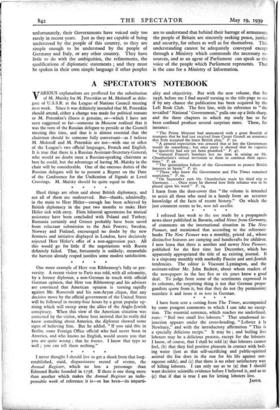I never thought I should live to get a shock
from that long- established, staid, dispassionate record of events, the Annual Register, which no less a personage than Edmund Burke founded in 1758. If there is one thing more than another which makes the Annual Register an indis- pensable work of reference it is—or has been—its imparti- ality and objectivity. But with the new volume, that for 1938, before me I find myself turning to the title-page to see if by any chance the publication has been acquired by the Left Book Club. The first line, with its reference to "the so-called 'National 'Government," pulls one up a little sharp, and the three chapters to which my study has so far been confined produce several surprises more. These, for instance : "The Prime Minister had announced with a great flourish of trumpets that he had just received from Count Grandi an assurance that Italy accepted the latest British plan." P. to.
"A general expectation was aroused that at last the Government would do something ; but once more it showed that its capacity for inactivity had not yet been plumbed." P. 47.
"General Franco's bombers lost no time in seizing on Mr. Chamberlain's virtual invitation to them to continue their opera- tions." P. 49.
"The ignominious failure of the Government to protect British interests in Spain." P. so.
"Those who know the Government and The Times remained suspicious." P. 69.
"On September 29th Mr. Chamberlain made his third trip to Germany. . . . Once more he showed how little reliance was to be placed upon his word " P. 74.
I learn from the dust-cover that "the volume is intended to assist all those who need in a handy form an accurate knowledge of the facts of recent history." On which the just comment seems to be, non tali auxilio.


















































 Previous page
Previous page